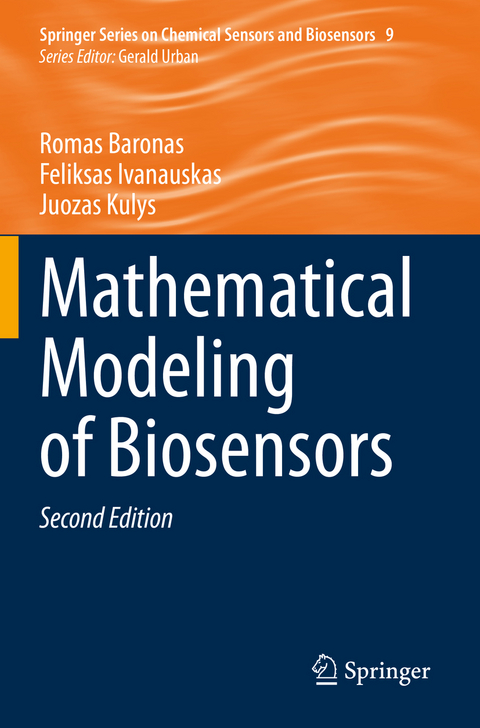
Mathematical Modeling of Biosensors
Springer International Publishing (Verlag)
9783030655075 (ISBN)
This newly designed and enlarged edition offers an up-to-date presentation of biosensor development and modeling from both a chemical and a mathematical point of view. An entire new chapter in particular is dedicated to optimal design of biosensors. Two more new chapters discuss biosensors which utilize microbial cells and are based on carbon nanotubes respectively. All the other chapters have been revised and updated.
The book contains unique modeling methods for amperometric, potentiometric and optical biosensors based mainly on biocatalysts . It examines processes that occur in the sensors' layers and at their interface, and it provides analytical and numerical methods to solve equations of conjugated enzymatic (chemical) and diffusion processes. The action of single enzyme as well as polyenzyme biosensors and biosensors based on chemically modified electrodes is studied. The modeling of biosensors that contain perforated membranes and multipart mass transport profiles is critically investigated. Furthermore, it is fully described how signals can be biochemically amplified, how cascades of enzymatic substrate conversion are triggered, and how signals are processed via a chemometric approach and artificial neuronal networks. The results of digital modeling are compared with both proximal analytical solutions and experimental data.
lt;b>Romas Baronas he is a Professor at the Institute of Computer Science of the Vilnius University (Lithuania) since 2005, and his main research interests cover computational modeling of nonlinear phenomena in life sciences. He received his Ph.D. in Computer Science at the same university in 2000, and from 2006 to 2017 he headed the Department of Software Engineering at the Vilnius University. He was the director of the Institute of Computer Science in 2018-2019, and as of 2019, he also works as the chairman of the Research Council of Lithuania. In 2012 he was awarded the Lithuanian Science Prize.
Introduction to Modeling of Biosensors.- Effects of Diffusion Limitations on the Response and Sensitivity of Biosensors.- Biosensors Utilizing Consecutive and Parallel Substrates Conversion.- Biosensors Response Amplification with Cyclic Substrates Conversion.- Biosensors Utilizing Synergistic Substrates Conversion.- Biosensors Acting in Injection Mode.- Chemically Modified Enzyme and Biomimetic Catalysts Electrodes.- Biosensors with Porous and Perforated Membranes.- Biosensors Utilizing Non Michaelis-Menten Kinetics.- Biosensors Based on Microreactors.- Modeling Carbon Nanotube Based Biosensors.- Modeling Biosensors Utilizing Microbial Cells.- Application of Mathematical Modeling to Optimal Design of Biosensors.
| Erscheinungsdatum | 18.02.2022 |
|---|---|
| Reihe/Serie | Springer Series on Chemical Sensors and Biosensors |
| Zusatzinfo | XVII, 456 p. 152 illus., 12 illus. in color. |
| Verlagsort | Cham |
| Sprache | englisch |
| Maße | 155 x 235 mm |
| Gewicht | 724 g |
| Themenwelt | Medizin / Pharmazie ► Physiotherapie / Ergotherapie ► Orthopädie |
| Technik | |
| Schlagworte | allosteric enzyme layer • bi-enzyme biosensors • bioluminescent biosensor • BOD biosensor • carbon nanotube based biosensors • chemically modified electrodes • consecutive substrates conversion • cyclic substrates conversion • Enzymatic Kinetic • glucose dehydrogenase-based biosensor • heterogeneous microreactor • Metabolite biosensor • Microbial Cells • Nernst diffusion layer • Non Michaelis-Menten Enzyme • Non Michaelis–Menten Enzyme • optimal design of biosensors • parallel substrates conversion • perforated membranes • synergistic substrates conversion |
| ISBN-13 | 9783030655075 / 9783030655075 |
| Zustand | Neuware |
| Informationen gemäß Produktsicherheitsverordnung (GPSR) | |
| Haben Sie eine Frage zum Produkt? |
aus dem Bereich


